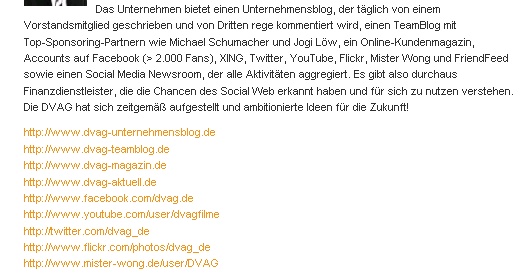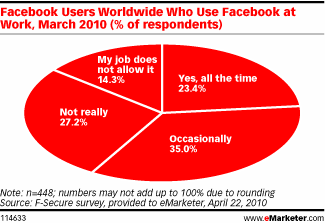 Es freut mich immer wieder, wenn meine User mir mit Kommentaren interessanten und neuen Input liefern.
Es freut mich immer wieder, wenn meine User mir mit Kommentaren interessanten und neuen Input liefern.
Manchmal überlegt man, wie man jetzt auf einen Kommentar reagieren soll. Da mir das in nachfolgendem Beispiel schon mehrfach so gegangen ist, brauche ich mal Input von meinen Usern und Social Media Experten.
Das Beispiel des Kommentars bezieht sich auf das Phänomen der Promotion eigener Social Media Newsroom. Und die Frage ist, ob und wenn ja, wie man auf diesen Kommentarfall reagieren und eingehen soll.

Dem Verfasser möchte ich für die ausführlichen Infos danken. Ein wahrlich interessanter und diskussionwürdiger Ansatz, den die DVAG da fährt und der mir bisher unbekannt war. Dort werden wahrlich alle sozialen Medien als Kommunikations-Channel bespielt.
Nun aber eine grundsätzliche Diskussion hierzu…
Inwieweit sind Blogs dazu da, seine unternehmerischen Botschaften und klassischen PR aktivitäten in aller Ausführlichkeit dazustellen und zu platzieren?
Wäre der Hinweis auf den Social Media Newsroom genug gewesen, indem ich EINEN Link setze? Wenn ja, wo setze ich diesen Link: Bei der Angabe meiner Daten (Name, Email und Webadresse) oder erst im Text oder an beiden Stellen?
Ein Social Media Newsroom sollte alle Verlinkungen in die soziale Web-Welt in sich bergen. So kann jeder Web-User sehen, was das Unternehmen im Social Web so macht.
Sieht man sich die Seite der DVAG an, so ist das auch der Fall. Und dieser Lin wurde ja auch angegeben. Nur ist mir unklar, ob man dann die anderen Link ebenfalls benötigt (Gefahr des “Linkschleuder-Ansatzes”)?! Sollte man trotzdem alle Social Seiten einzeln auflisten?
Wäre es ein gutes Vorgehen gewesen, mal via eine Business Networks wie XING oder LinkedIn die Konversation mit mir zu suchen und auf die Präsenzen hinzuweisen?
Diese Fragen gingen mir durch den Kopf als ich kommentieren wollte. Der kommentar wäre zu lange geworden. Dieser Post kam zustande…
Ich denke, es hilft allen, wenn wir hier mal Feedback sammeln. Freue mich auf Eure Meinungen…
 Can social media have a psychological influence on your customers? According to Dr. Rachna Jain it can if we see it from a perspective of spreading content the viral way. This, she shows seven strategies companies can employ to help their content succeed.
Can social media have a psychological influence on your customers? According to Dr. Rachna Jain it can if we see it from a perspective of spreading content the viral way. This, she shows seven strategies companies can employ to help their content succeed.





